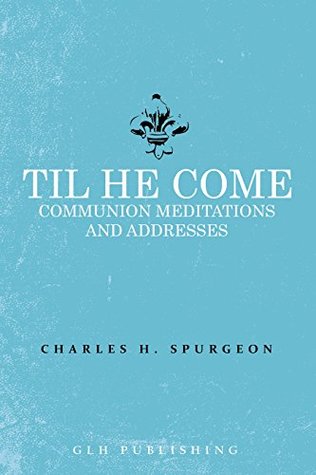- Bíblia
- Leia a Bíblia
- Versões da Bíblia
- Verso do dia
- Planos de Leitura
- Versos por Tópico
- Books of the Bible
- Imagens bíblicas
- Estude
- Comentários
- Concordâncias
- Dicionários
- Enciclopédias
- Sermões
- Bible Atlas & Maps
- BP Wiki
- Devocionais
- Devocionais de hoje
- Light of the World
- Todos os devocionais
- Inspirational Quotes
- Mais
- Picture Quotes
- Videos
- Inspirador
- Estudo da Bíblia
- O que a Bíblia diz
- Bible Q&As
- Daily Bread
- Bible by Genre
- Bible Stories
- Random Bible Verse
- Comunidade
- Store
Til He Come: Communion Meditations and Addresses
by C.H. Spurgeon
For many years, whether at home or abroad, it was Mr. Spurgeon's constant custom to observe the ordinance of the Lord's supper every Sabbath-day, unless illness prevented. This he believed to be in accordance with apostolic precedent; and it was his oft-repeated testimony that the more frequently he obeyed his Lord's command, "This do in remembrance of Me," the more precious did his Saviour become to him, while the memorial celebration itself proved increasingly helpful and instructive as the years rolled by. Several of the discourses here published were delivered to thousands of communicants in the Metropolitan Tabernacle, while others were addressed to the little companies of Christians,—of different denominations, and of various nationalities,—who gathered around the communion table in Mr. Spurgeon's sitting-room at Mentone. The addresses cover a wide range of subjects; but all of them speak more or less fully of the great atoning sacrifice of which the broken bread and the filled cup are the simple yet significant symbols. Spurgeon had intended to publish a selection of his Communion Addresses; so this volume may be regarded as another of the precious literary legacies bequeathed by him to his brethren and sisters in Christ who have yet to tarry a while here below. It is hoped that these sermonettes will be the means of deepening the spiritual life of many believers, and that they will suggest suitable themes for meditation and discourse to those who have the privilege and responsibility of presiding at the ordinance.
BUY NOW
Kindle Edition, 226 pages
Published September 18th 2016 by GLH Publishing (first published December 31st 1969)
Se inscrever
© 2025 Bibleportal.com Todos os direitos reservados.

C.H. Spurgeon (1834 - 1892)
Spurgeon quickly became known as one of the most influential preachers of his time. Well known for his biblical powerful expositions of scripture and oratory ability. In modern evangelical circles he is stated to be the "Prince of Preachers." He pastored the Metropolitan Tabernacle in downtown London, England.His church was part of a particular baptist church movement and they defended and preached Christ and Him crucified and the purity of the Gospel message. Spurgeon never gave altar calls but always extended the invitation to come to Christ. He was a faithful minister in his time that glorified God and brought many to the living Christ.
Charles Haddon Spurgeon was England's best-known preacher for most of the second half of the nineteenth century. In 1854, just four years after his conversion, Spurgeon, then only 20, became pastor of London's famed New Park Street Church (formerly pastored by the famous Baptist theologian John Gill).
The congregation quickly outgrew their building, moved to Exeter Hall, then to Surrey Music Hall. In these venues Spurgeon frequently preached to audiences numbering more than 10,000 - all in the days before electronic amplification.
In 1861 the congregation moved permanently to the new Metropolitan Tabernacle.
... Show more